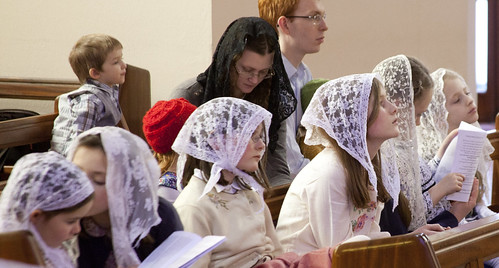 |
| Children in Mass at the recent Family Retreat, |
A mother who watches over her child with tenderness and compassion helps him or her to grow in confidence and to experience that the world is a good and welcoming place. This helps the child to grow in self-esteem and, in turn, to develop a capacity for intimacy and empathy. A father, for his part, helps the child to perceive the limits of life, to be open to the challenges of the wider world, and to see the need for hard work and strenuous effort. A father possessed of a clear and serene masculine identity who demonstrates affection and concern for his wife is just as necessary as a caring mother. There can be a certain flexibility of roles and responsibilities, depending on the concrete cirumstances of each particular family. But the clear and well-defined presence of both figures, female and male, creates the environment best suited to the growth of the child.
We often hear that ours is “a society without fathers”. In Western culture, the father figure is said to be symbolically absent, missing or vanished. Manhood itself seems to be called into question. The result has been an understandable confusion. “At first, this was perceived as a liberation: liberation from the father as master, from the father as the representative of a law imposed from without, from the father as the arbiter of his children’s happiness and an obstacle to the emancipation and autonomy of young people. In some homes authoritarianism once reigned and, at times, even oppression”. Yet, “as often happens, one goes from one extreme to the other. In our day, the problem no longer seems to be the overbearing presence of the father so much as his absence, his not being there. Fathers are often so caught up in themselves and their work, and at times in their own self-fulfilment, that they neglect their families. They leave the little ones and the young to themselves”. The presence of the father, and hence his authority, is also impacted by the amount of time given over to the communications and entertainment media. Nowadays authority is often considered suspect and adults treated with impertinence. They themselves become uncertain and so fail to offer sure and solid guidance to their children.
A reversal of the roles of parents and children is unhealthy, since it hinders the proper process of development that children need to experience, and it denies them the love and guidance needed to mature.
God sets the father in the family so that by the gifts of his masculinity he can be “close to his wife and share everything, joy and sorrow, hope and hardship. And to be close to his children as they grow – when they play and when they work, when they are carefree and when they are distressed, when they are talkative and when they are silent, when they are daring and when they are afraid, when they stray and when they get back on the right path. To be a father who is always present. When I say ‘present’, I do not mean ‘controlling’. Fathers who are too controlling overshadow their children, they don’t let them develop”. Some fathers feel they are useless or unnecessary, but the fact is that “children need to find a father waiting for them when they return home with their prob-lems. They may try hard not to admit it, not to show it, but they need it”. It is not good for children to lack a father and to grow up before they are ready,
Support the work of the LMS by becoming an 'Anniversary Supporter'.
I think the section beginning with part 301 is rather shocking. It seems to belittle objective truth, even natural law, and consider it 'little details' which can be disregarded, and not impede a life of grace. The only way it can get away with this, is by not giving specific examples (same-sex couples? Divorced and remarried couples? Non-married couples?), and thus remaining ambiguous.
ReplyDeleteThis part seems to be addressing moral culpability as determined by factors other than objective truth. As such, it is entirely consistent with the Catholic tradition.
DeleteOr am I missing something in your concerns?